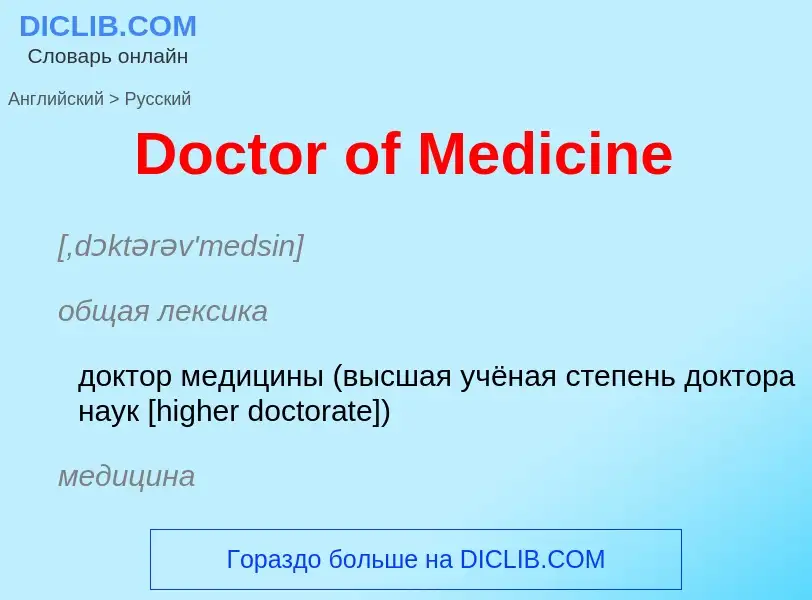Traducción y análisis de palabras por inteligencia artificial ChatGPT
En esta página puede obtener un análisis detallado de una palabra o frase, producido utilizando la mejor tecnología de inteligencia artificial hasta la fecha:
- cómo se usa la palabra
- frecuencia de uso
- se utiliza con más frecuencia en el habla oral o escrita
- opciones de traducción
- ejemplos de uso (varias frases con traducción)
- etimología
D M Doctor of Medicine - traducción al Inglés
[,dɔktərəv'medsin]
общая лексика
доктор медицины (высшая учёная степень доктора наук [higher doctorate])
медицина
доктор медицинских наук
Смотрите также
[,di:'lɪt]
общая лексика
от лат. Doctor Litterarum
сокращение
от Doctor of Letters (ставится после фамилии)
Definición
Wikipedia
Doctor of Medicine (abbreviated M.D., from the Latin Medicinae Doctor) is a medical degree, the meaning of which varies between different jurisdictions. In the United States, and some other countries, the M.D. denotes a professional degree. This generally arose because many in 18th-century medical professions trained in Scotland, which used the M.D. degree nomenclature. In England, however, Bachelor of Medicine, Bachelor of Surgery was used and eventually in the 19th century became the standard in Scotland too. Thus, in the United Kingdom, Ireland and other countries, the M.D. is a research doctorate, honorary doctorate or applied clinical degree restricted to those who already hold a professional degree (Bachelor's/Master's/Doctoral) in medicine. In those countries, the equivalent professional degree to the North American, and some others use of M.D., is still typically titled Bachelor of Medicine, Bachelor of Surgery (M.B.B.S.). A provider who holds a Doctor of Chiropractic (D.C.) degree has a "doctoral" degree and sometimes can be referred to as a "doctor," but is not the same as a healthcare provider who holds a Doctor of Medicine (M.D.) degree since the M.D. degree confers much more authoritative clinical capacities, greater autonomy, and responsibility.

![The [[thesis]] presented by [[Claude Bernard]] to obtain his doctorate of medicine (1843) The [[thesis]] presented by [[Claude Bernard]] to obtain his doctorate of medicine (1843)](https://commons.wikimedia.org/wiki/Special:FilePath/Claude Bernard's thesis for his doctorate Wellcome M0011459.jpg?width=200)
![The [[University Medical Center Freiburg]] The [[University Medical Center Freiburg]]](https://commons.wikimedia.org/wiki/Special:FilePath/UniKlinik (Freiburg) 4.jpg?width=200)
